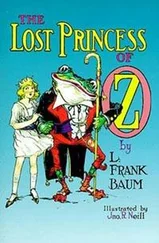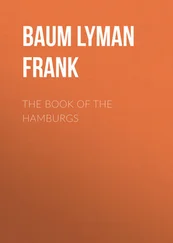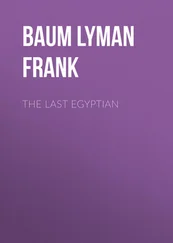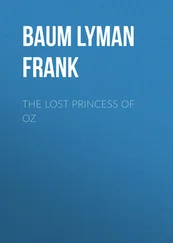L. Baum - The Last Egyptian
Здесь есть возможность читать онлайн «L. Baum - The Last Egyptian» весь текст электронной книги совершенно бесплатно (целиком полную версию без сокращений). В некоторых случаях можно слушать аудио, скачать через торрент в формате fb2 и присутствует краткое содержание. Год выпуска: 2019, Издательство: epubBooks Classics, Жанр: Прочие приключения, на английском языке. Описание произведения, (предисловие) а так же отзывы посетителей доступны на портале библиотеки ЛибКат.
- Название:The Last Egyptian
- Автор:
- Издательство:epubBooks Classics
- Жанр:
- Год:2019
- ISBN:нет данных
- Рейтинг книги:4 / 5. Голосов: 1
-
Избранное:Добавить в избранное
- Отзывы:
-
Ваша оценка:
- 80
- 1
- 2
- 3
- 4
- 5
The Last Egyptian: краткое содержание, описание и аннотация
Предлагаем к чтению аннотацию, описание, краткое содержание или предисловие (зависит от того, что написал сам автор книги «The Last Egyptian»). Если вы не нашли необходимую информацию о книге — напишите в комментариях, мы постараемся отыскать её.
The Last Egyptian — читать онлайн бесплатно полную книгу (весь текст) целиком
Ниже представлен текст книги, разбитый по страницам. Система сохранения места последней прочитанной страницы, позволяет с удобством читать онлайн бесплатно книгу «The Last Egyptian», без необходимости каждый раз заново искать на чём Вы остановились. Поставьте закладку, и сможете в любой момент перейти на страницу, на которой закончили чтение.
Интервал:
Закладка:
The viscount paused to examine the door carefully. It had been most cleverly constructed, and fitted its opening accurately. Six huge bronze bolts, working upon springs, were ranged along its edge, and the single hinge was of enormous size and likewise composed of solid bronze. But he could see no keyhole nor lever by means of which the door had been opened. The outer surface was an irregular rock, harmonizing with the side of the passage, but the edges and the inner surface were carefully dressed with chisels. An examination of the casing showed bronze sockets for the bolts securely embedded in the cliff, and he could understand that when the door was closed the bolts fastened themselves automatically. But how had it been opened? That was a mystery he could not penetrate; for Kāra, after unlocking the door, had inadvertently withdrawn the dagger from the secret orifice and carried it with him into the tomb. It was a foolhardy proceeding, for if by chance he dropped the dagger inside the passage, he would forever afterward be powerless to enter the tomb again, since it was the only key to the treasure–chamber in existence. Besides, the removal of the dagger from the orifice was useless; for, as Hatatcha had once explained to Kāra, the door could not be opened from the inside.
Consinor felt convinced that the Egyptian must have gone through this passage, so he cautiously entered the doorway. It was a long, straight way, slanting downward, and before he had proceeded far, the atmosphere became dense and stifling. Still, he decided that where Kāra had gone he also could go, and so persevered, holding the candle above his head and walking as swiftly as he dared.
Meantime the Egyptian had penetrated to the vast mummy chamber, where, because of his haste, he neglected to light any of the bronze lamps, depending alone upon the dim illumination which the flickering wick of his small lamp afforded. He passed the bodies of Hatatcha and Thi–Aten, with scarcely a glance in their direction, and hastened between the rows of mummy cases toward the upper end of the room. Here, majestically imposing, stood the great sarcophagus of Ahtka–Rā, its thousand jewels glittering wierdly in the fitful glare of the floating wick, as Kāra held the lamp close to its side to detect the secret spring in the malachite slab that opened the way to the treasure–chamber.
The stone slid back with a sound that seemed like a moan of protest, and the Egyptian gave a nervous start as, for the first time, a realization of his dread surroundings flashed upon him.
But he controlled himself and muttered: “Perhaps it is the ghost of my great ancestor, bewailing the loss of his talisman. If his spirit could creep back from the far nether world, it would doubtless demand of me the return of the Stone of Fortune…. Not yet, Ahtka–Rā!” he called aloud, mockingly; “save your curse for a year longer, and it will not be required. Just now I have more need of the talisman than you have!”
With these words he crawled into the aperture and descended the steps to the room below. He had brought with him two canvas sacks, one of which he proceeded to fill with the poorest and least valuable of the ornaments that littered the place. Even then the tribute to Sheik Antar was far in excess of the value of his services, and Kāra groaned at the necessity of bribing the crafty Arab so heavily.
The other sack was to contain his own treasure, and that he might avoid frequent visits to this gloomy place, which he began to dread, he selected the rarest of the great gems and the richest golden jewelry for himself, tumbling all together into the receptacle until it was full to overflowing and could only be tied at the neck by shaking down the contents.
The two sacks were heavy when he picked them up to carry them away. He suspended the bronze lamp in front of him by attaching its chain to a button of his gray coat. Then, a burden under either arm, he ascended the stairs and stepped from the orifice into the chamber above.
As he did this, the weight of the treasure shifted, and he stumbled and fell heavily against the massive sarcophagus of Ahtka–Rā. The jar of the impact was enough to send the golden bust of Isis toppling from its place. It struck Kāra in the breast, upsetting the lamp and leaving him in total darkness. Then it rebounded and caught his hand, crushing it against the marble side of the tomb. The sharp pain caused by this made him cry out and cling, faint and ill, to the stones of the sarcophagus. There, motionless, he stood in the dark and listened while the bust fell into the opening at his feet, and slowly rolled, step by step, into the treasure–chamber beneath, finally adding itself with a hollow crash to the rich hoard the ages had accumulated therein.
Kāra shuddered. The awful incident, the blackness that enveloped him, the clamor of noise in that silent place and the quiet suspense succeeding it, all conspired to unnerve him and fill his heart with consternation. The sacks had fallen from his grasp. He raised his injured hand, felt it, and gave a sudden cry of terror. The ring containing his ancestor’s precious Stone of Fortune had been broken by the blow and the talisman was gone.
Gone! Then the curse had fallen. It was upon him even now, and perhaps at his side stood the grim spirit of Ahtka–Rā, leering at him through the darkness and exulting in his discomfiture.
Trembling in every limb, the Egyptian fell upon his knees and began creeping here and there upon the clammy stones, his eyes staring into the gloom and his fingers clutching at every slight protuberance in the hope of finding again the wonderful stone that could alone protect him in his extremity. The curse was upon him, but he would resist its awful power. He must resist; for if he succumbed now, there would be no future escape from his fate. The stone—he must find the stone! Somewhere in that vast chamber of death it lay, slyly waiting for him to reclaim it.
The cold indifference that was an integral part of Kāra’s nature had completely deserted him. The superstitious fear inherited by him from the centuries had gripped his heart securely and made him its bond–man. He mumbled incoherently as, prone upon all fours, he shuffled hither and thither in his vain search. The words of warning contained in the tiny parchment, the solemn curse of his ancestor upon any who deprived him of the talisman of fortune, seemed alone to occupy a mind suddenly rendered witless and unruly by the calamity of the moment.
The darkness was oppressive. There was no sound since the golden bust had bumped its way into the treasure–chamber. The atmosphere, although fed and restored from some hidden conduit, seemed stagnant and full of the bituminous stench of the mummies. Kāra drew his quaking body about with an effort, feeling that the silence, the dead air and the blackness were conspiring to stifle him. He found the lamp presently, but the oil was spilled and the wick gone. It did not occur to him to strike a match.
“If the stone is here,” he thought, “I shall see its flaming tongues even through the darkness. It cannot escape me. I must seek until I find it.”
Twice he crept around the colossal sarcophagus of Ahtka–Rā, feeling his way cautiously and glaring into the darkness with distended eyeballs; and then came his reward. A streak of fire darted before his eyes and vanished. Another succeeded it. He paused and watched intently. A faint blue cloud appeared, whence the flames radiated. Sometimes they were crimson; then a sulphurous yellow; then pure white in color. But they always darted fiercely from the central cloud, which gradually took form and outlined the irregular oblong of the wonderful stone.
The radiance positively grew; the tongues of flame darted swifter and more brilliantly; they lighted the surrounding space and brought into relief the glistening end of Ahtka–Rā’s tomb.
Читать дальшеИнтервал:
Закладка:
Похожие книги на «The Last Egyptian»
Представляем Вашему вниманию похожие книги на «The Last Egyptian» списком для выбора. Мы отобрали схожую по названию и смыслу литературу в надежде предоставить читателям больше вариантов отыскать новые, интересные, ещё непрочитанные произведения.
Обсуждение, отзывы о книге «The Last Egyptian» и просто собственные мнения читателей. Оставьте ваши комментарии, напишите, что Вы думаете о произведении, его смысле или главных героях. Укажите что конкретно понравилось, а что нет, и почему Вы так считаете.












